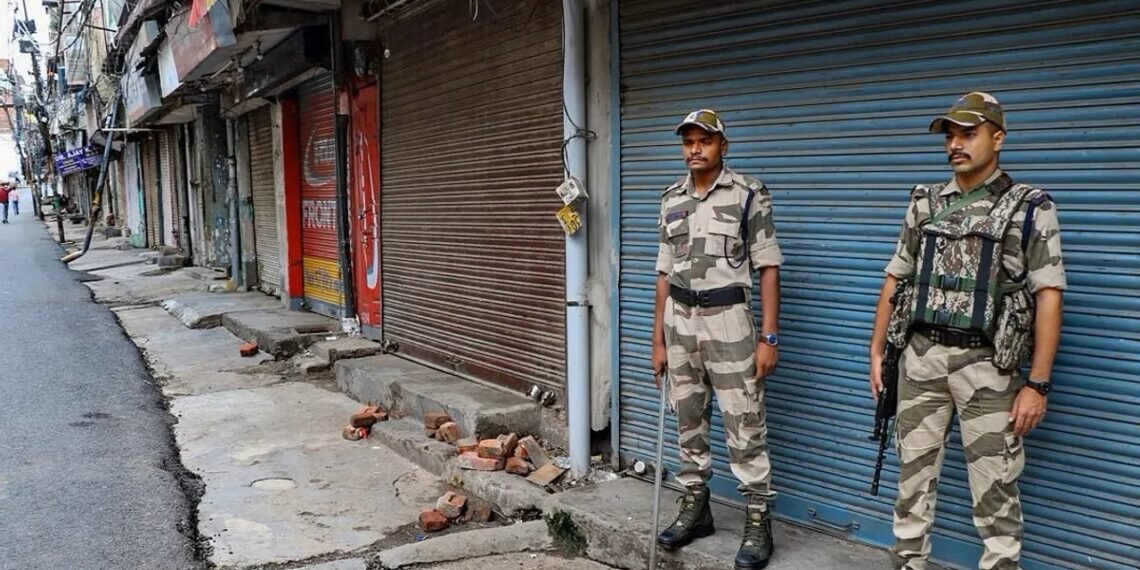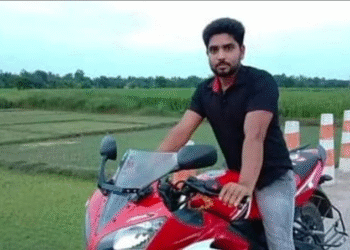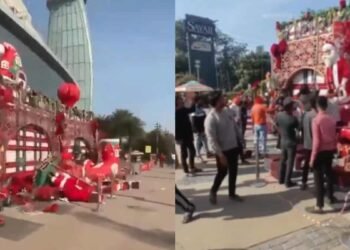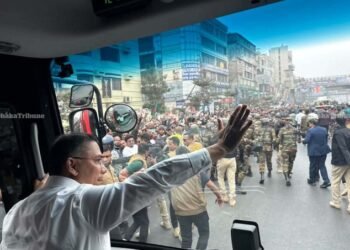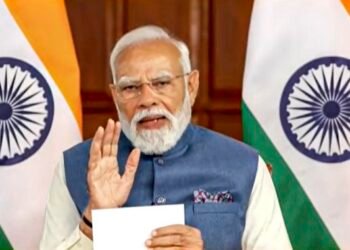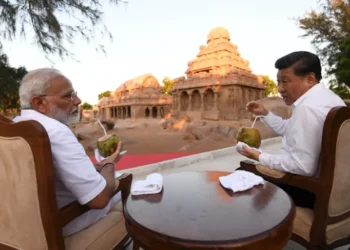While Meitei-majority Imphal backed COCOMI’s bandh protesting the removal of “Manipur” from a state bus, tribal-dominated hill districts like Churachandpur and Senapati carried on as usual—highlighting a fractured state identity.
BY PC Bureau
May 22, 2025 — A 48-hour bandh called by the Coordinating Committee on Manipur Integrity (COCOMI), a prominent Meitei civil society organization, brought life in the Imphal Valley to a standstill beginning midnight on May 21. The protest, triggered by the removal of the word “Manipur” from a government bus en route to the Shirui Lily Festival, has further laid bare the widening ethnic fault lines in the strife-torn northeastern state.
Shops, schools, offices, and public transport services in the Meitei-majority Imphal Valley were completely shut down as the bandh gained near-total compliance. Protesters set up roadblocks, burned tires, and enforced the shutdown in areas like Wangkhei, Khurai, Kongba, Kwakeithel, and Naoremthong.
COCOMI convenor Khuraijam Athouba denounced the removal of the state’s name from the vehicle as an “anti-Manipur act,” demanding an apology from Governor Ajay Kumar Bhalla and the resignation of the Chief Secretary, Director General of Police, and Security Advisor. “This is not a mere administrative lapse—it is a symbolic attack on Manipur’s identity,” Athouba stated during a press briefing.
Hill Districts Remain Unmoved
Manipur: 48-hour bandh called by COCOMI affects normal life in Imphal Valleyhttps://t.co/jOPfMlZHiD#Manipur #ManipurBandh #Imphal #Meitei #COCOMI #ManipurCrisis pic.twitter.com/DtUWkoJ3kU
— NewsDrum (@thenewsdrum) May 22, 2025
In stark contrast, the hill districts, home to the Kuki-Zo and Naga communities, showed little to no response to COCOMI’s bandh call. Shops and commercial establishments remained open, and daily life continued uninterrupted in areas like Churachandpur, Kangpokpi, and Senapati. This defiance mirrors earlier instances, such as the 2018 bandh called by valley-based student organizations, which was similarly ignored in the hills. The lack of participation reflects not only logistical separation—hills and valley are geographically distinct—but also a profound socio-political disconnect rooted in ethnic differences.

(Normal life in Churachandpur on May 22 afternoon. No impact of Bandh)
REAd: IJU Slams Media Harassment by Security Forces in Manipur
The hill communities, particularly the Kuki-Zo, have their own grievances, often centered on demands for separate administration and protection of tribal rights. These demands stem from historical tensions, exacerbated by the ethnic violence that erupted on May 3, 2023, following a Manipur High Court order recommending Scheduled Tribe status for the Meiteis. The violence, which has claimed over 260 lives, injured 1,500, and displaced 60,000-70,000 people, has deepened mistrust between the Meiteis and Kuki-Zo communities. The hills’ non-response to the bandh signals a rejection of Meitei-led initiatives, perceived as prioritizing valley interests over those of the tribal populations.
READ: Kuki-Chin Forum Demands Justice After Alleged Torture, Killing of 10 PDO Members
A Tale of Two Protests
The bandh’s valley-centric success and hill-based disinterest reflect parallel political realities. On May 3 this year, the second anniversary of the 2023 ethnic clashes, the divide was again evident. While COCOMI organized a “Manipur People’s Convention” and shutdown in the valley to reaffirm state unity, the Kuki-Zo community marked a “Day of Separation” in the hills, calling for a distinct administrative setup.
These dual observances—Sintha Leppa in the valley and Separation Day in the hills—highlight how even collective trauma is interpreted through divergent lenses. For Meiteis, unity and integrity are paramount; for the Kuki-Zo, autonomy and self-governance are survival imperatives.
A Fractured State, A Fading Center
The political backdrop further complicates the picture. Following the resignation of Chief Minister N. Biren Singh in February 2025, Manipur has been under President’s Rule. Efforts by the central government in March to restore free movement between the hills and valley have met stiff resistance, especially from Kuki-Zo groups who continue to reject integration under a Meitei-majority state.
The current ethnic segregation is stark: Meiteis and Kuki-Zo populations avoid crossing into each other’s territories, with security forces maintaining a fragile peace. While deployment prevents immediate violence, it has done little to bridge the deepening mistrust between communities.
A Call for Inclusive Dialogue
The events of May 21–22 are a reminder that in today’s Manipur, no issue—however symbolically powerful—can command universal resonance. With 40 of 60 assembly seats concentrated in the valley, and 90% of the land occupied by hill tribes who feel politically marginalized, the state remains at a critical crossroads.
Observers and community leaders have urged the central government to prioritize inclusive dialogue. “This isn’t just about a name on a bus,” one political analyst noted. “It’s about decades of mistrust, marginalization, and the absence of a shared vision for Manipur’s future.”
Without a genuine effort to engage all communities—Meitei, Kuki-Zo, Naga, and others—the bandh may be remembered not as a defense of Manipur’s integrity, but as another moment that laid bare how deeply fractured the state has become.


